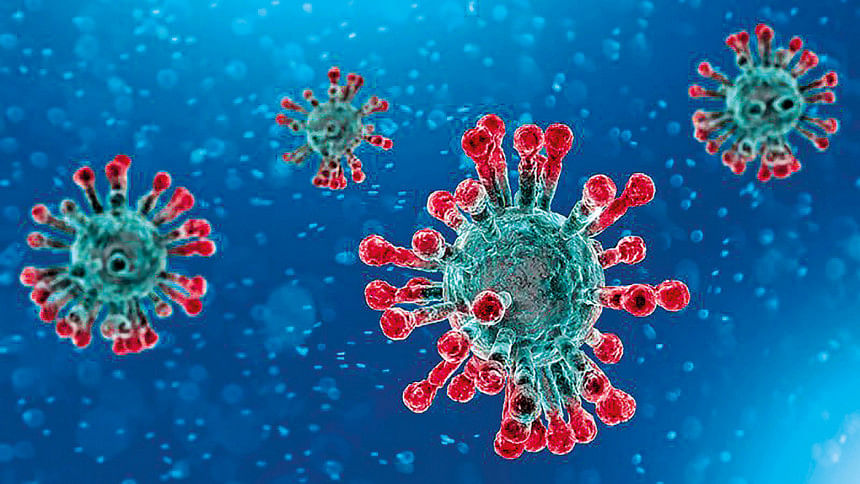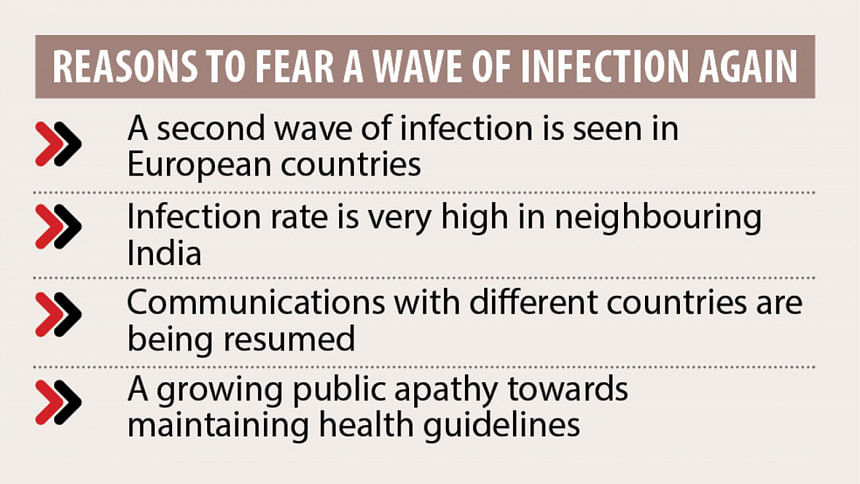Brace yourself for second wave

With infections and deaths from Covid-19 still far from over, a high-powered technical committee has warned that a "second wave" of coronavirus infections may be coming, advising the government to prepare a roadmap and take all-out preparations to prevent the possible resurgence.
The National Technical Advisory Committee (NTAC), formed to advise the government on its coronavirus response, sounded a note of caution about taking measures to detect infections quickly, in case the second wave hits the country.
Apart from preventive measures, the government should take utmost preparations to ensure proper healthcare, suggested the committee during its 20th online meeting on Sunday night with its Chairperson Prof Mohammad Shahidullah presiding over it.
"A second phase of Covid-19 infection is seen in different countries, and the infection rate is very high in neighbouring India. Communications with different countries are being resumed and it will continue. A growing public apathy towards maintaining health safety guidelines is also being witnessed," said the technical body in a statement.
"These are reasons to fear a wave of infection in our country again," it said.
The warning comes as the Covid-19 death toll in the country closes in on 5,000 over the last six months. The total number of people infected has now risen to 350,621.
Hours after the warning came, Prime Minister Sheikh Hasina yesterday asked the authorities concerned to take necessary preparation to tackle the possible second wave.
During an unscheduled discussion over the Covid-19 at the weekly cabinet meeting, the PM instructed the authorities to take precautions for dealing with different cold-related diseases as the winter is set to arrive at the end of October or mid-November.
"She especially gave instructions to take precaution in case the country witnesses a second wave of Covid-19 transmission," said Cabinet Secretary Khandker Anwarul Islam while briefing reporters at the secretariat after the meeting.
The prime minister gave utmost importance on ensuring use of face masks, he said, adding that they have already passed on some instructions in this regard.
The cabinet secretary said punitive actions would be taken against the authorities of shopping malls and restaurants if people were found without masks there.
On the other hand, the religious affairs ministry was asked to take steps through Islamic Foundation so that every mosque comes up with announcements twice a day about the necessity of wearing face coverings.

WHAT IS A SECOND WAVE?
A "second wave," in the context of a viral pandemic, does not have a formal scientific definition or a distinctly defined stage. It is generally taken as a stage when an outbreak appears to be receded almost entirely before returning or when it ebbs and flows on a seasonal basis.
And in order to say one wave has ended, the virus would have to be brought under control and cases have to fall substantially.
A number of countries like France, Spain, the UK, and Austria are witnessing a resurgence in Covid-19 cases after having brought the number of cases falling and the curve of infections flattening.
Prof Nazrul Islam, a member of the NTAC, however, said the first wave of the Covid-19 infections was yet to be passed.
"We did not cross the first stage yet. If we can bring the transmission rate below 5 percent, then we will be able to say that we have crossed the first phase. If the transmission rate rises again, then we will be able to say that we have entered the second phase," he told The Daily Star.
The noted virologist said the positivity rate was around 13 percent as of Sunday and if the rate was brought under 5 percent then it could be said that the first phase of infections was under control.
"It is possible to enter the second phase even if we cannot bring the first phase under control. If the positivity rate starts to rise again, we can tell we are entering the second phase."
Prof Nazrul, also a former vice chancellor of Bangabandhu Sheikh Mujib Medical University, said it did not matter whether the country was in the first stage or was entering the second one.
Taking precautionary measures is the most important thing right now, he said.
He also said if proper precaution was not be taken for the second wave, then more people would die, the progress in different sectors gained would be halted again and reopening of educational institutions would be delayed further.
"The prime minister has given directives on taking precaution for a possible second wave and she has rightly done it. It's because we had many shortcomings while dealing with the first stage. The directives have been given so that the mistakes are not repeated," he said.
The NTAC at Sunday night's meeting said the country still needed isolation centres for suspected coronavirus patients and those who have tested positive for the virus.
More tests were needed to be carried out to detect the second wave as well, it said, recommending strengthening screening and isolation measures of travellers at airports and borders and issuing travel advice as many Bangladeshis are returning home amid the pandemic.
CAPACITY TO TACKLE SECOND WAVE
After the warning of a possible second wave came, Health Services Division Secretary Abdul Mannan yesterday held a discussion with officials of his ministry and different agencies concerned to get an idea about their capability to tackle the possible second phase.
Prof Abul Bashar Mohammad Khurshid Alam, director general of Directorate General of Health Services, said the expert group, namely Public Health Expert Divisional Advisors' Group, at a meeting on Thursday gave several suggestions on how to tackle the possible second wave.
"We are working following their suggestions," he told The Daily Star last night.
Experts' suggestions included raising awareness, keeping the hospitals, including those which have been decommissioned recently as Covid-19 dedicated hospitals, ready, increase the number of tests and tackle the situation with vaccines, which are yet to come, said the DG.
The Cabinet Division has meanwhile convened a meeting over the Covid-19 situation and possible second wave today. Secretaries of different ministries concerned are expected to attend it.


 For all latest news, follow The Daily Star's Google News channel.
For all latest news, follow The Daily Star's Google News channel. 



Comments